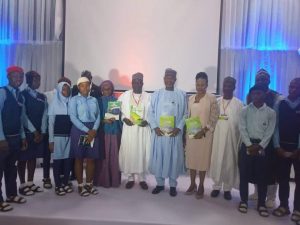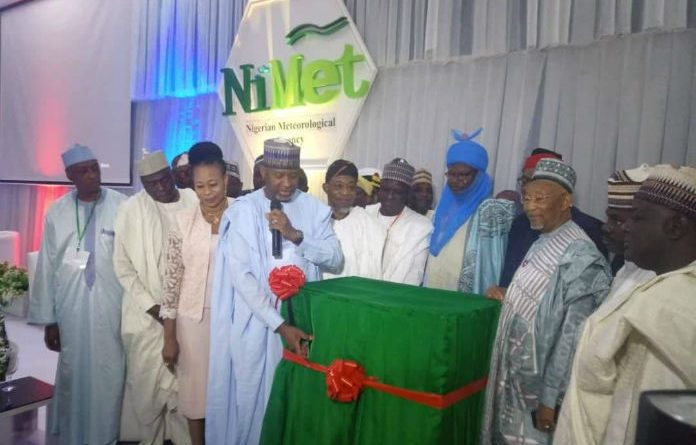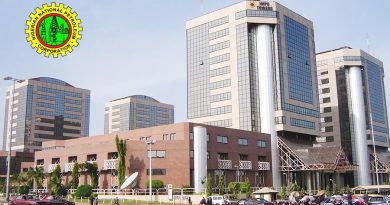NiMet unveils 2020 Seasonal Rainfall Prediction as Stakeholders Extol Accuracy
Oru Leonard
The 2020 Seasonal Rainfall Prediction (SRP), was unveiled by the Nigerian Meteorological Agency (NiMet) with much expectation from various sectors of the economy.
The SRP report which usually guide the sectors was released officially by the Honourable, Minister of Aviation, Senator Hardi Sirika on Tuesday, January 21, 2020 at Abuja, the Federal Capital City of Nigeria.
While giving some details of the prediction, the Minister announced that the predicted 2020 onset of the growing season is expected to be ‘near-normal to earlier than normal in most parts of the country’ with the earliest onset date likely to occur on the 24th of February around the coastal zone of the south-south states while states like Sokoto, Kebbi, Zamfara, Katsina, Jigawa, Yobe and Borno are predicted to likely have their onset from 2nd June, 2020.
On Cessation: ‘A normal to later than normal’ cessation is expected across the country. The earliest cessation date, 26th September 2020 is expected around Katsina and the northern parts of Sokoto while the latest cessation date is expected on the 28th December 2020 over the Niger-Delta region.
Length of Growing Season: ‘A normal to longer than normal length of the season’ is generally predicted across the country. In the year 2020, the length of the growing season is expected to span 110-160 days in the Sahelian region of the north and 210-280 days in the south.
Rainfall Amount: A ‘normal to above normal’ rainfall is expected generally in the country. It is expected that total rainfall amounts will range from 400mm in the north to about 3000mm in the south.
Pre- Onset Rainfall (False Onset): Before the full establishment of the onset of the planting season over the various ecological zones, a couple of rainfall events are expected to occur which could be enormous and tend to give a false start of the season.
Such rainfall events are not uncommon, however, their frequency seems to be on the rise. Some forcing functions have been observed to be likely responsible and will be monitored carefully and keep Nigerians informed. Farmers should, therefore, avoid early planting during this period to avoid losses.
Dry spells: A severe dry spell that may last up to 10 to 21 days is expected in areas such as Niger, Bauchi, Jigawa, Sokoto, Zamfara, Katsina, Kano, Kebbi, Yobe and Borno in the months of June and July which may last between two to three weeks after the Onset. Farmers should moisture conservation techniques to avoid crop losses during this period.
Flash Floods: The normal to near normal rainfall pattern in the country does not rule out the possibility of isolated flash floods due to increasing high-intensity rainfall at the peak of the season, especially in areas that are naturally prone to flooding.
“As part of its response to address the challenges of Climate Change, the Federal Government had developed a National Framework for the Application of Climate Services (NFACS) as a downscaled version of the Global Framework on Climate Services(GFCS) to enable Nigeria better manage the risks while maximising opportunities arising from climate variability and change.
“It will build a partnership, mobilise resources, coordinate national response and activities as well as develop infrastructure for climate services.
“A partnership approach, involving all relevant stakeholders at all levels (Federal, States and LGAs), will ensure its success.
“A concerted and coordinated national effort elaborated in this Framework will, therefore, contribute to improving the well-being of Nigerians, particularly communities that are more vulnerable to impacts of climate extremes.
“On this, NiMet, by virtue of its mandate, is largely responsible for providing climate information and has established infrastructure delivering climate services in the country. The role of NiMet in these regards is therefore unequivocal and I assure Nigerians that the Federal Ministry of Aviation will continue to support NiMet to discharge this responsibility to the nation,” the Minister said.
“Some forcing functions have been observed to be likely responsible and will be monitored carefully and keep Nigerians informed. Farmers should therefore avoid early planting during this period to avoid losses” the report revealed.
The Aviation Minister had in his keynote address stated that since inception of the President Muhammadu Buhari administration, the government has “clearly stated Nigeria’s commitment to combat climate change. In keeping to this commitment, this country has been participating actively in the UNFCCC activities, including the adoption of the Paris Agreement, which has ‘set the stage’ for implementation of emission control across the globe.
“The INDCs which have now fully become Nationally Determined Contributions (NDCs), that Nigeria is implementing with priority areas in mostly weather-sensitive sectors, especially Agriculture, Water Resources, Energy, Transportation, Health and Disaster management. The role of NiMet in implementing these NDCs is therefore obvious in the light of Section 7 of its Establishment Act. 2003, which states the functions of the Agency”, the Minister said.
According to him, “The Federal Government is very committed to supporting the advancement of Meteorology for national development in all sectors. Mr. President’s zeal in signing the ‘Paris Agreement’ in 2015 is a testimony to his conviction that the ‘Climate Crisis’(which is increasing in intensity and manifested by the day) will have to be tackled head-on.”
He observed that “this cannot be achieved if we are unable to improve on tracking and monitoring extreme weather and climate events. We shall in this respect continue to support and encourage NiMet to do more in order to meet the aspirations of Mr. President and deliver on the country’s commitment to the Paris Agreement.”

In their messages at the unveiling of the report, stakeholders at the event urged NiMet to ensure that its predictions and information get to the rural communities to enable the local farmers benefit. This is even as farmers from different parts of the country eulogised the agency for the accuracy level of its predictions that have helped them reduces their losses and improve their yield.
Earlier in his welcome address, the Director, Applied Meteorological Services, Engr. Mailadi Yusuf Abba Misau, noted that the agency “has strives to ensure that the 2020 SRP and the 2019 Climate Review are issued early enough for sector planners to start planning early to take advantage of the predictions as they relate to their sectors, and, for researchers to take stock of what happened last year. The result is what we are witnessing today with your support and cooperation – the presentation of the 2020 SRP in the first month of the year”
Speaking, the Director-General of NiMet, Prof Abubakar Sank Mashi, while presenting the SRP, said that the ENSO-neutral phase observed in December 2019 would most likely continue to dominate the country’s weather system until the first quarter of 2020 and extend to April and the same phase is expected to persist from May through July to September.
He disclosed that greater parts of the country are expected to record near average temperatures, but said there would be some areas that would experience temperature anomalies that are about two degrees Celsius above normal, especially places in the extreme North.
Professor Mashi, advised that with SRP 2020 prediction, high vigilance is required over the extreme northern fringes of Borno , Yobe, Jigawa and Katsina states .
He also urged policy-makers to take note of these periods and make adequate arrangements to prevent the outbreak of diseases that are probable in such areas.




